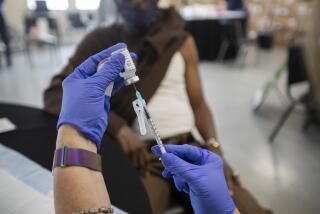Study Links Poor Health to Poverty
- Share via
Suggesting that the cycle of poverty may be harder to break than is commonly believed, an unusual study that tracked 1,100 Californians through 30 years of economic ups and downs has found that people in low-income families are more likely than well-off counterparts to develop physical and mental problems that interfere with daily life.
The new findings, published today in the New England Journal of Medicine, show that sustained economic hardship has roughly the same negative health impact as a regular cigarette habit, said the lead author, epidemiologist John Lynch of the University of Michigan. He and a Michigan colleague collaborated with a researcher at the Human Population Laboratory in Berkeley.
In the study, the researchers collected economic information on a group of Alameda County residents in 1965, 1974 and 1983. Then, in 1994, the subjects filled out a questionnaire asking about their physical and cognitive capabilities, mood, and mental outlook.
Those who reported economic hardship in each year surveyed were at least three times more likely than the others to have trouble walking, cooking, dressing and performing other routine tasks in 1994. They were also at least three times more likely to be depressed, have some memory impairment, or to experience the sort of hostile emotions that are reportedly linked to heart disease.
The researchers did not specifically address the policy implications of their work, beyond pointing out that the gap between the richest and poorest seems to be growing and “economic policies that polarize the income distribution may have serious short-term and long-term health consequences.” Still, Lynch, who is from Australia, which has universal government health coverage, said in an interview that he would favor a comprehensive government medical program.
Many of the low-income subjects in the study were among the so-called working poor, who often lack private health insurance and yet make too much money to qualify for state and federal health insurance plans. The study defined low income as less than twice the federal poverty level for a family of four in each year surveyed.
The study, among the most thorough of its kind, addresses a question that has troubled social scientists and policy experts for years. Although it is recognized as a truism that poorer people have more health problems than the economically advantaged, researchers have a hard time disentangling whether poverty causes health problems or health problems cause poverty, given that disability can reduce income.
The Alamada County study, which has provided data for a number of other social-science papers over the years, helps resolve that question because it followed subjects over a long period, rather than simply doing a spot survey.
Also strengthening the case for low income or outright poverty being a sort of pathogen that causes health problems, Lynch said, was the observed “dose-response” relationship: People who reported economic hardship in all three surveys were more likely to have health problems than those who reported two bouts of hard times, and so forth.
“This is the best scientific evidence I know of that the relationship between economic hardship and health outcomes is real and important,” Lynch said.
The researchers do not know precisely why lower income promoted diminished health and functioning. But Lynch said the negative effect was not simply due to secondary health factors like obesity or harmful habits like smoking, which tend to be more common among poorer people.






